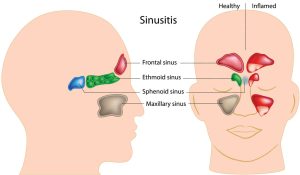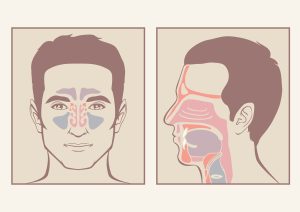
TREATMENT OF SINUS INFECTIONS
Treatment of sinus infections. The tissues in your sinuses the air-filled spaces in your forehead, cheeks, and nose inflame when you have sinusitis. Among other symptoms, it produces runny or stuffy noses, face pain, and occasionally fever. Although the common cold is typically the culprit, sinusitis can also be brought on by other viruses, bacteria, fungus, and allergies.
TREATMENT OF SINUS INFECTIONS
The swelling or inflammation of the tissue lining your sinuses is known as sinusitis. Your face contains structures called sinuses that are typically filled with air. Allergies, Bacterial infections, viral infections can irritate them, resulting in blockage and fluid accumulation. A stuffy nose, nasal congestion, and facial pressure and pain are some of the symptoms that may result from this.
Types

Less than four weeks is the duration of acute sinusitis symptoms, which include nasal congestion, discharge, facial pain or pressure, and diminished sense of smell. Usually, viruses like the common cold are at blame. The symptoms of subacute sinusitis last four to twelve weeks. The symptoms of chronic sinusitis persist for at least 12 weeks. Usually, bacteria are to blame. Recurrent acute sinusitis symptoms persist fewer than two weeks and recur four or more times in a single year. Viral and bacterial sinusitis The majority of sinusitis instances are caused by viruses, such as those that cause the common cold. Bacteria can either induce sinusitis or infect you following a viral sinusitis episode. Bacterial sinusitis may be the cause of your runny or stuffy nose and facial pain that doesn’t go away after 10 days. It’s possible for your symptoms to appear to go better before coming back and getting worse. In most cases, decongestants and antibiotics are effective treatments for bacterial sinusitis.
Signs

The following are typical signs of a sinus infection: Mucus running down your throat is known as postnasal drip. thick yellow or green mucus with a runny nose. stuffed nose. pressure on your face, especially in the areas around your eyes, nose, and forehead. Bending over or moving your head around may make this worse. Your teeth may feel pressure or pain. ache or pressure in the ears. Fever. Halitosis, or poor breath, or a terrible taste in your mouth. Cough. Headache.
Causes

Sinusitis can be brought on by bacteria, fungus, viruses, and allergies. Among the specific causes of sinusitis are: the typical cold. The influenza virus. microorganism called Streptococcus pneumoniae. influenza-causing Haemophilus bacterium. bacteria called Moraxella catarrhalis. seasonal and nasal allergies.
Treatment

TREATMENT OF SINUS INFECTIONS
Depending on your symptoms and how long you’ve had them, there are numerous ways to treat sinusitis. A sinus infection can be treated at home using: Decongestants. over-the-counter (OTC) drugs for allergies and colds. saline nasal rinses. consuming a lot of liquids. If sinusitis symptoms don’t go away after ten days, a doctor could recommend: Antibiotics. either topical or oral decongestants. Intranasal steroid sprays with a prescription. (Nonprescription sprays and drops may worsen congestion, so don’t use them for more than three to five days.)
Prevention
There are several strategies to lower your chance of developing sinus infections, depending on the cause, such as: following your provider’s instructions to rinse your nose with saline (salt water). taking precautions against allergies. Medication, allergy injections, and avoiding recognized triggers for your allergies (such as smoke, dust, or pollen) are all part of this. If your doctor advises it, use steroid nasal sprays. developing healthy handwashing practices and other behaviors that lower your risk of contracting infectious diseases. Steer clear of smoke. If you smoke, there are strategies to help you stop.
Summary
Most of the time, sinus infections are not dangerous. Numerous factors, such as allergies, nasal polyps, and germs and viruses, can cause them. Generally, you may take care of yourself at home by getting enough sleep, using over-the-counter medications, drinking lots of water. If you have any symptoms that are concerning to you, if sinusitis occurs frequently, or if your symptoms don’t get better, get in touch with your doctor.